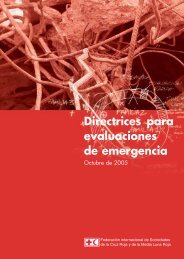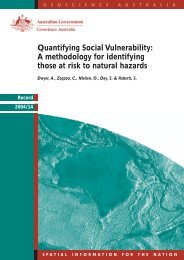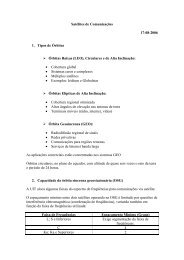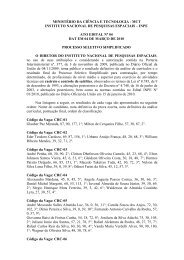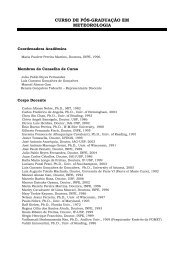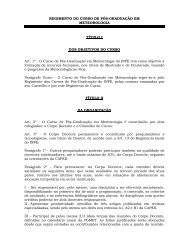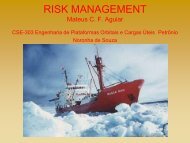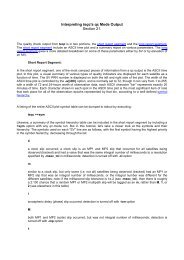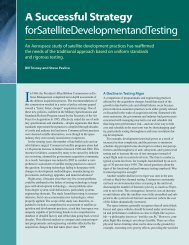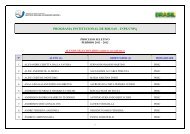Living with Risk. A global review of disaster reduction initiatives
Living with Risk. A global review of disaster reduction initiatives
Living with Risk. A global review of disaster reduction initiatives
Create successful ePaper yourself
Turn your PDF publications into a flip-book with our unique Google optimized e-Paper software.
6<br />
<strong>Living</strong> <strong>with</strong> <strong>Risk</strong>: A <strong>global</strong> <strong>review</strong> <strong>of</strong> <strong>disaster</strong> <strong>reduction</strong> <strong>initiatives</strong><br />
318<br />
ate evidence on the economic and financial<br />
impact <strong>of</strong> <strong>disaster</strong>s on longer-term development,<br />
to develop methodologies and standards<br />
for conducting damage and needs<br />
assessments following a <strong>disaster</strong>, to<br />
strengthen communities' resilience to the<br />
impact <strong>of</strong> <strong>disaster</strong>s and to identify innovations<br />
in risk transfer and financing.<br />
The World Bank<br />
1818 H Street, N.W.<br />
Washington, D.C. 20433, United States<br />
Tel: (+1-202) 473 1000<br />
Fax: (+1-202) 477 6391<br />
Web sites: w.worldbank.org/html/extdr/backgrd/ibrd/<br />
www.worldbank.org/dmf<br />
www.proventionconsortium.org<br />
International Labour Organization (ILO)<br />
ILO is the United Nations agency specialized<br />
in matters related to labour and seeks the<br />
promotion <strong>of</strong> social justice and internationally<br />
recognized human and labour rights. ILO is<br />
based in Geneva, Switzerland.<br />
In 1999, to address the new trends characterized<br />
by <strong>global</strong>ization, socially and environmentally<br />
sustainable growth patterns and the consequence<br />
<strong>of</strong> economic reforms and structural<br />
adjustment in many developing countries,<br />
ILO established a special In-Focus<br />
Programme on Crisis Response and Reconstruction<br />
(IFP/Crisis) that concentrates on<br />
various types <strong>of</strong> crises including natural <strong>disaster</strong>s.<br />
The Programme is implementing the ILO<br />
Decent Work approach-emphasizing employment-to<br />
lay the foundations for crisis prevention,<br />
by promoting employment and creating<br />
the conditions for long-term reintegration,<br />
reconstruction, economic growth and sociopolitical<br />
stability. Activities <strong>of</strong> the Programme<br />
related to <strong>disaster</strong> <strong>reduction</strong> include:<br />
• Knowledge development-ILO knowledge<br />
in crisis situations is continuously<br />
<strong>review</strong>ed, updated and expanded <strong>with</strong> the<br />
latest data and analyses. Links are<br />
strengthened <strong>with</strong> ILO technical units<br />
and field <strong>of</strong>fices, external research institutions<br />
and crisis practitioners worldwide;<br />
• Tools development-Ready-made guidelines<br />
and standard packages to answer the<br />
specific needs <strong>of</strong> each individual crisis<br />
context and to steer rapid response action.<br />
These essential tools underpin effective<br />
work, especially in ILO areas <strong>of</strong> concern;<br />
• Technical assistance-Direct interventions<br />
in emergencies are undertaken, for rapid<br />
needs assessment, programme development<br />
and implementation and to reduce<br />
the likelihood and inverse impact <strong>of</strong> future<br />
crises;<br />
• Capacity-building-Capacity to respond<br />
effectively to crises is strengthened<br />
through wide dissemination <strong>of</strong> the above<br />
tools, along <strong>with</strong> training programmes and<br />
advisory services;<br />
• Advocacy-A variety <strong>of</strong> activities promote<br />
national, subregional, regional and international<br />
recognition <strong>of</strong> the employment<br />
dimension and other ILO crisis concerns<br />
and its contribution to effective crisis<br />
management. They include awarenessraising<br />
workshops, presentations, publications,<br />
videos and public material;<br />
• Resource mobilization-Efforts are made to<br />
mobilize resources internally and externally<br />
for timely interventions.<br />
ILO<br />
Route des Morillons 4,<br />
CH-1211 Geneva 22, Switzerland<br />
Tel: (+41-22) 799 7722<br />
Fax: (+41-22) 799 6895<br />
E-mail: edemp@ilo.org<br />
Web site: www.ilo.org<br />
International Telecommunication Union<br />
(ITU)<br />
ITU, <strong>with</strong> its headquarters in Geneva, Switzerland,<br />
is an international organization where<br />
governments and the private sector coordinate<br />
<strong>global</strong> telecommunication networks and services.<br />
ITU is a member <strong>of</strong> the ISDR Inter-Agency<br />
Task Force on Disaster Reduction.<br />
In 1994, the ITU Plenipotentiary Conference<br />
in Kyoto, following the Yokohama Conference<br />
on Natural Disaster Reduction, emphasized<br />
the importance <strong>of</strong> telecommunications for<br />
<strong>disaster</strong> mitigation and <strong>disaster</strong> relief operations.<br />
In 1998, the Tampere Convention on the<br />
Provision <strong>of</strong> Telecommunication Resources for



